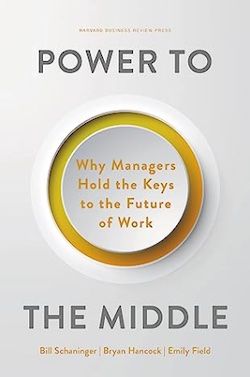For years, middle managers have been mocked, neglected and eliminated. They are frequently lampooned in movies and TV shows for holding futile meetings, sending useless emails and preparing pointless reports. When an employee has a brilliant new idea, it’s common to blame the middle manager for sending it to bureaucratic purgatory.
3 Reasons Why You Should Invest in Your Middle Managers
- Middle managers are better positioned to give employee feedback.
- Middle managers have the ability to get the most out of individual employees.
- Middle managers know how to reallocate resources to avoid layoffs or drops in productivity.
In fact, whenever something goes wrong at a company, it’s easy to blame middle management, either as an individual entity or as an abstract idea. And yes, as management consultants, we know there are a fair number of ineffective and downright incompetent middle managers out there. But if you know of any who fit the negative stereotype, it’s probably because they never should have been promoted into that position in the first place, or they never received the training and coaching they needed to succeed.
Why Middle Managers Are Vital to Company Success
With the right training and practice, middle managers are in the best position to evaluate employee performance and provide feedback that’s continuous rather than just a pro forma yearly review meant to create a paper trail. Once the bureaucratic shackles are removed from their duties, they are the ones who can truly understand how to get the best out of their workers. Once they are given the power to challenge outdated ways of operating, they have the ability to truly transform the workplace.

This is in stark contrast to a view that started to take hold in the 1980s: that the middle layers of management were a prime place to cut costs. Companies often put shareholder value front and center as a priority, supported by consultancies including McKinsey. And what’s a great way to boost a company’s stock price? By slashing payroll costs — by far the biggest expense for most employers.
The Cost of Overlooking Middle Management
But, as is often the case with management strategy, the pendulum swung too far in the direction of shareholder value. This is clear from the authors’ work with clients, where a too-thin layer was stretched and exhausted. Bill [Schaninger] has seen this firsthand, having been part of client projects that were largely focused on company turnarounds or cutting costs, where layoffs were a quantifiable way to achieve cost savings. The simple laws of capitalism demand that costs can’t outweigh revenue for long. At the same time, Bill saw that organizations that removed too many middle managers from their ranks ran the risk of realizing some dire effects on the entire organization: on performance, on productivity, and on long-term success.
When cost cutting becomes necessary, managers are the ones who can help companies carry it out in a more sustainable way. Too often we have seen a revolving door of indiscriminate layoffs after a bust and then rehires after an ensuing boom. If only senior leaders would enlist their managers to redeploy workers rather than letting them go, they would avoid a lot of disruption and lost productivity. This is hard to pull off, though, when the managers themselves are getting the ax, too.
Cutting middle managers, and then ignoring and neglecting the ones who remain, has a dire effect on turnover. If companies don’t change the way they reward and promote their best middle managers, they will lose them, and in a cascading effect they’ll also lose the people who worked for those managers. And thanks to websites like Glassdoor that survey what it’s like to work at a company, they’ll lose job applicants to companies with low scores on quality of management.
***
Reprinted by permission of Harvard Business Review Press. Excerpted from the book Power to the Middle: Why Managers Hold the Keys to the Future of Work by Bill Schaninger, Bryan Hancock and Emily Field. Copyright 2023 Harvard Business School Publishing Corporation. All rights reserved.





